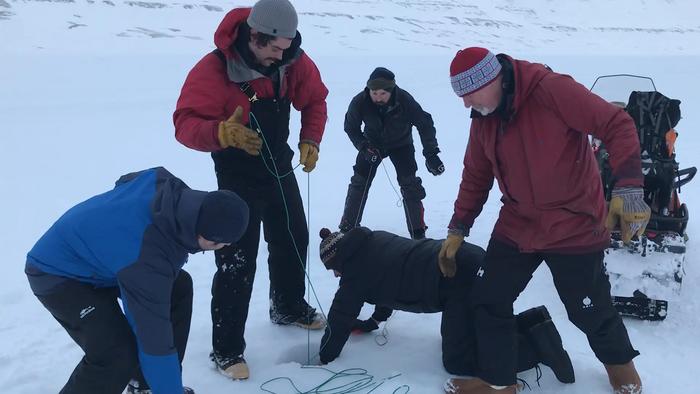AMHERST, Mass. – A team of scientists led by François Lapointe, a research associate at the University of Massachusetts Amherst, has combined paleoclimatic data from the last 2,000 years with powerful computer modeling and in-the-field research on lake sediments and tree rings to show that an understudied phenomenon, known as atmospheric blocking, has long influenced temperature swings in the Arctic. As temperatures warm due to climate change, atmospheric blocking will help drive ever-wilder weather events. The study focused on the Norwegian Arctic archipelago, Svalbard, at the edge of the Arctic Ocean, and was published in Nature Communications.

Credit: Raymond Bradley
AMHERST, Mass. – A team of scientists led by François Lapointe, a research associate at the University of Massachusetts Amherst, has combined paleoclimatic data from the last 2,000 years with powerful computer modeling and in-the-field research on lake sediments and tree rings to show that an understudied phenomenon, known as atmospheric blocking, has long influenced temperature swings in the Arctic. As temperatures warm due to climate change, atmospheric blocking will help drive ever-wilder weather events. The study focused on the Norwegian Arctic archipelago, Svalbard, at the edge of the Arctic Ocean, and was published in Nature Communications.
It is well known that the Arctic is warming faster than the global average, a phenomenon known as Arctic Amplification. But, since 1991, Svalbard has experienced a warming trend that is double the Arcticwide rise in temperature. Consequently, the archipelago has been experiencing massive loss of ice, extreme rainfall events and landslides. “We wanted to know why Svalbard has been warming so much faster than the rest of the Arctic,” says Raymond Bradley, Distinguished Professor at UMass Amherst and co-author of the study, “and to figure out whether or not these trends would continue.”
To do so, they turned to lake sediments from Lake Linné, on the west coast of Svalbard, to help them reconstruct warm and wet conditions during the past 2,000 years. What makes this lake unique is the presence of instruments that have been deployed since 2012 by UMass Amherst alumnus and co-author, Michael Retelle, currently professor of earth and climate sciences at Bates College. These instruments track the precise timing of sediment entering the lake each year. Sediment pours into the lake during the increasingly frequent freak rainstorms.
Lapointe and his team looked at the calcium levels in Lake Linné’s sediments. Because much of the eastern terrain surrounding the lake is composed of carbonate-rich soil, intense rain events mean that carbonate washes into the lake, settles into the sediment on the lake bottom, and can be measured in sediment cores as a record of rainfall stretching back approximately 2,000 years.
When Lapointe and his colleagues compared all these historic and contemporary observations to the meteorological record, they found a stunning correlation.
“The biggest rain and warming events of the past are all linked to atmospheric blocking over Scandinavia and the Ural Mountains. Atmospheric blocking is when a high-pressure system, with air rotating clockwise around it, stalls over a particular region—in this case northern Scandinavia. In tandem with this high-pressure system, rain events in Svalbard are also often associated with a low-pressure system that settles in over Greenland, which rotates counter-clockwise,” Lapointe says. The two systems spin like a pair of intermeshed gears, drawing warmer, moister air up from the mid-Atlantic Ocean into the Arctic, leading to downpours of rain in Svalbard. Since observational measurements started, blocking in the Arctic has increased, as has Arctic warming.
“It will be very interesting to observe how atmospheric blocking behaves with further warming,” adds Lapointe. “Any further increase will likely amplify the effects of floods and natural hazards in Svalbard.”
Such projections for Svalbard’s future are concerning. Though the archipelago has a year-round population of just 2,650, the islands attracted over 130,000 visitors a year, drawn to their breathtaking landscapes and unique wildlife.
Contacts: Francois Lapointe, flapointe@umass.edu
Daegan Miller, drmiller@umass.edu
Journal
Nature Communications
Article Title
Climate extremes in Svalbard over the last twomillennia are linked to atmospheric blocking
Article Publication Date
3-Jun-2024



